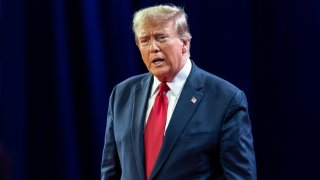On Foreign Policy, the Presidential Debate Was Not Very Enlightening
Neither Donald Trump nor Kamala Harris offered compelling solutions to the urgent problems bedeviling American foreign policy.
American political “debates” are not usually debates at all. The candidates rarely interact directly, and when they do, the media rates them on the “zingers” or clever phrases that emanate from their mouths. The foreign policy aspect of the recent debate between former President Donald Trump and Vice President Kamala Harris was no different. Not much new or enlightening information came forward.
Trump is always friendly to foreign authoritarian leaders, whom he believes are as tough as he is. Hungarian strongman Viktor Orban claimed that China, Russia, and North Korea were all afraid of Trump. What a political endorsement for a candidate who purports to be running for president of a republic! After that boost, who needs an endorsement from Taylor Swift?
Trump laudably argued that Europe should be paying more for the Ukrainian war effort but refused to state that he wants Ukraine to win the war. Perhaps he doesn’t want to rile another foreign dictator that he admires—Vladimir Putin. But Trump did show he was prudently conscious of Putin’s ability to escalate the conflict to the use of nuclear weapons. However, opposing the invasion of another sovereign country is a separate issue from arguing about who should pay for its defense. Wealthy countries in Ukraine’s vicinity should be more concerned about Russian aggression than the faraway United States.
Harris bluntly defended the Biden administration’s withdrawal from Afghanistan, mentioning that four presidents said they wanted to withdraw, but Biden was the one to accomplish it. Harris did usefully point out that the rapid Afghan withdrawal was originally Trump’s idea, that he made a “weak deal” with the Taliban to govern it, that he bypassed the Afghan government to negotiate it directly with the Taliban, that 5,000 Taliban fighters were released as part of the deal, and that Trump even invited the Taliban to Camp David. More Trumpian affinity for thugs and authoritarians, but he did get the ball rolling on Biden’s eventual withdrawal.
However, Harris didn’t have a good answer for why the withdrawal had been so chaotic or why the Biden administration didn’t realize the Afghan government would collapse as quickly as it did. Before the debate, White House national security spokesman John Kirby seemed to say that no one in the U.S. national security bureaucracies predicted it either. Another U.S. intelligence failure, I guess.
Both candidates’ campaign stump speeches mostly contained the usual schtick. Trump crowed about getting NATO allies to pay a little more into the collective security pot. Still, he avoided the larger question of whether rich NATO countries cannot, in the long term, assume the entire defense burden against Russia (which can boast a GDP only the size of Italy’s).
As for Harris, she adamantly stated she believes in Israel’s right to self-defense and that the Gaza War must end. Yet, she gave no clues as to how she’ll get there. She and the Biden administration had previously admitted that too many civilians are being killed in Gaza. But of course, she avoids admitting that Israeli prime minister Benjamin Netanyahu and his hawkish government have few incentives to end the fighting unless the United States threatens to cut off Israel’s weapons supplies or actually does so as a shot across the bow against a clear disproportionate Israeli response.
If we take a loose reading of foreign policy and include domestic policies that affect foreigners—tariffs and immigration—the debate wasn’t very enlightening on either. Trump obviously doesn’t know how tariffs work, even though he implemented them in his last term. He seems to think that foreign countries pay them to get access to U.S. markets. Instead, U.S. importers pay these import taxes and then pass the increased costs onto consumers, thereby raising prices and likely causing an uptick in inflation. Because of the increased costs for their products, however, foreign exporters may lose market share in the United States, thus indirectly providing a form of government-generated corporate welfare for U.S. producers. Although Trump correctly pointed out that the Biden-Harris administration has kept some of his tariffs in place, he has proposed even higher tariffs on China and other countries. If we want to fight inflation, removing all tariffs would be the best idea.
Another inflation-fighting policy would be to increase legal immigration. A big part of inflation is increasing wages, and admitting more workers would help keep wage hikes under control. Yet Trump, during the debate, repeatedly lied about immigration into the United States. He repeatedly alleged falsely that huge numbers of criminals are coming across U.S. borders. In fact, immigrants, legal or illegal, have lower violent crime rates than the American populace in general. And legal immigrants are often better educated than the average American. Harris should have mentioned these facts in favor of immigration but didn’t. All she said was that the Democrats had supported a strong border security bill. Still, Trump had ordered that congressional Republicans kill it to keep the issue alive for the election.
On the whole, this superficial, confusing, and sometimes flatly wrong debate was the wrong forum to discuss the complex issues of our world and time.
Ivan R. Eland is a Senior Fellow at the Independent Institute and Director of the Independent Institute’s Center on Peace & Liberty. Dr. Eland graduated from Iowa State University with an M.B.A. in applied economics and a Ph.D. in Public Policy from George Washington University.
Image: Lev Radin / Shutterstock.com.

